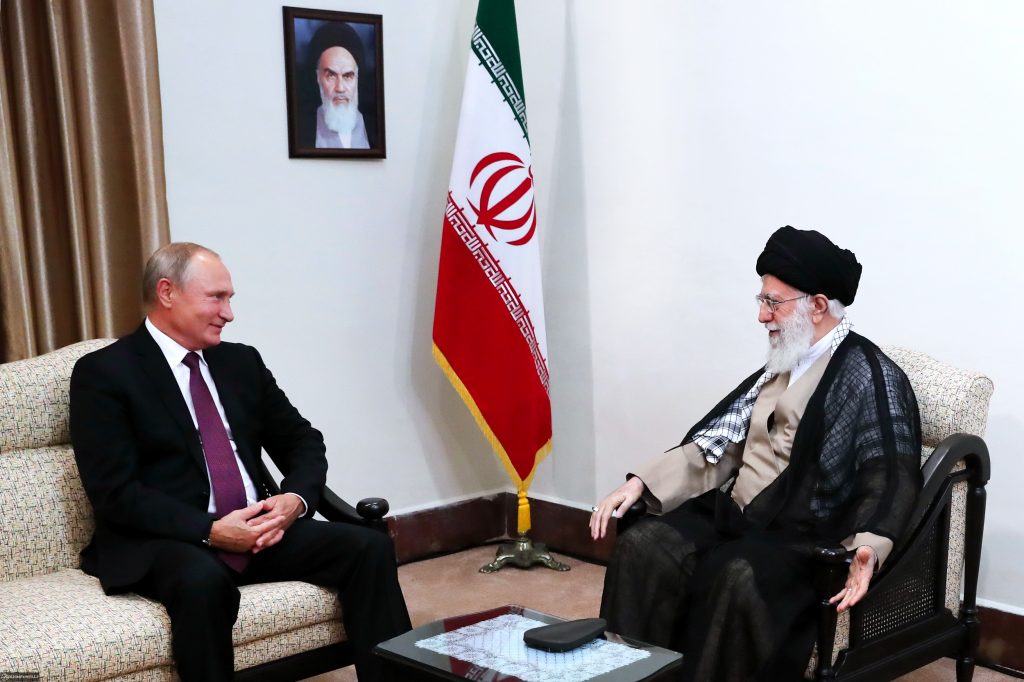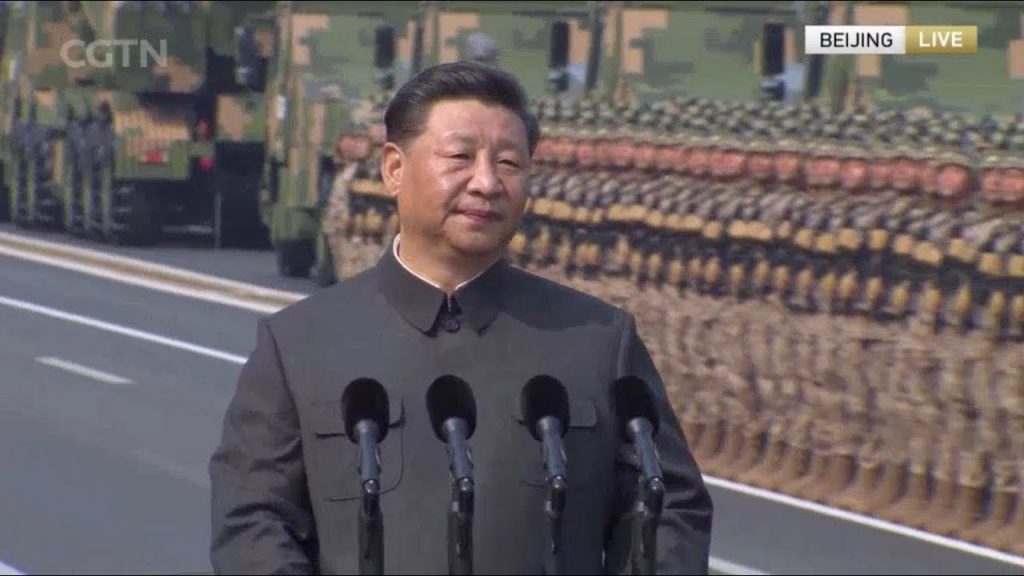Australia/Israel Review
Essay: Diplomatic Delusions
Jun 2, 2022 | Oved Lobel

Applying the lessons of Ukraine to Iran and China
The Russian invasion of Ukraine took many by surprise – it shouldn’t have. Since he took power, Russian President Vladimir Putin has been telling every world leader and representative in the West privately that Ukraine was not a real country, a long-standing and pervasive dogma in Russia, even among dissidents and anti-regime intellectuals. He has repeated this message publicly and in writing for years. Moreover, the full-scale invasion of Ukraine was the logical culmination of three decades of failed Russian attempts to bring Ukraine fully under its control, attempts that began even before the official collapse of the Soviet Union.
Despite decades of attempts by the West to diplomatically engage with and appease Russia and months of direct public and private warnings of what the political and economic consequences would be should Putin choose to invade, the Russian regime still opted to pursue its imperial ambitions. As German President and former Minister Frank-Walter Steinmeier recently admitted, “I did not believe Vladimir Putin would embrace his country’s complete economic, political and moral ruin for the sake of his imperial madness.”
The unfortunate Western delusion that imperial powers care about their economies or people is belied by the reality that these leaders are driven first and foremost by ideology. No matter how often they make this explicit in word and deed, Western leaders often ignore them, chalking up all rhetoric and action to domestic politics and mischaracterising proactive aggression as a reaction to Western policies and rhetoric. Neither carrots nor sticks can alter the calculus of autocratic imperial regimes, which are prepared to incur any cost in blood and treasure to pursue their openly expressed goals. This fact should impact how the West deals with two other such regimes aligned with Russia: Iran and China.
Iran
Like Putin’s regime, since 1979, the clerical regime ruling Iran has pursued regional imperialism at hideous cost to its economy and the lives of its citizens, prioritising the export of its Islamic revolution over any other concern. A core element of this imperialism, which has thus far brought Yemen, Syria, Lebanon, Gaza and, to a large extent, Iraq, effectively under the control of regional branches or proxies of Iran’s Islamic Revolutionary Guard Corps (IRGC), has been the regime’s nuclear weapons program.
From the Western perspective, Iran’s refusal to forego its uranium enrichment program for decades, despite being offered every possible incentive and suffering significant political and economic isolation as a result, is senseless. Iran, however, is happy to pocket political concessions and financial bribes such as those offered to her under the 2015 nuclear deal, the Joint Comprehensive Plan of Action (JCPOA), to temporarily stall certain elements of the program.
All of the regime’s activities are intimately linked – from hostage-taking and terrorism to regional destabilisation and the nuclear program – to its explicit overall goals, made clear at every level of the regime both rhetorically and practically, of exporting its revolution across the region and destroying Israel.
Yet the West continues to believe that diplomatically engaging the regime is the key to dealing with any of these issues. The lesson of fruitless engagement with Russia should be applied to Iran, which has also dragged out useless talks on coming back into compliance with the JCPOA for more than a year while it rapidly advanced its nuclear and missile capabilities. As flawed as the original deal itself was, it is only a subset of the broader problem with diplomatic engagement with Iran; namely, that the regime is implacably dedicated to its zero-sum conflict with the West and its partners.
This is on top of the fact that International Atomic Energy Agency Director-General Rafael Grossi pointed out a year ago that a linear return to the JCPOA was impossible due to Iran’s recent nuclear advances, many of which “only countries making bombs” would be pursuing. Like Russia, the Iranian regime cannot be bribed, cajoled or persuaded to abandon its aggressive goals; its ideology and the policies necessary to pursue it are non-negotiable. A renewed JCPOA would result in only one outcome: more money for Iran to pursue its imperial program, even as the regime continues to doggedly pursue a nuclear weapons capability.
Russia and Iran have long cooperated to expand their respective empires and undermine the US and its allies and partners. Thus, not only is diplomatic engagement with Iran or Russia of, at best, only limited utility and a means for them to extract political concessions in exchange for little or nothing, but it is a fantasy to imagine that productive cooperation is possible with either via compartmentalisation; for instance, thinking that Russia should continue to be involved in JCPOA negotiations despite its political isolation over Ukraine.
There is no evidence that Russia considers it a vital interest to prevent Iran gaining nuclear weapons, particularly given Moscow’s relationship with North Korea.
Furthermore, both Iran and Russia can and will cooperate to circumvent sanctions, something Iran has mastered over the years due to its long economic isolation.
Instead of trying to trade sanctions relief for temporary limits on Iran’s nuclear program, the US and its allies should expand sanctions, close loopholes and recognise once and for all that, as with Russia, further diplomatic engagement with wholly ideological regimes can only be a marginal part of a policy toolbox in which coercive tools must do most of the heavy lifting.
The purpose of sanctions should not be simply to pressure Iran into a deal, but also to buttress a broader containment policy, with a strong military component, both to limit Iran’s ability to carry out its ideological designs and to keep the regime constantly under pressure. Concessions and engagement will never change the Iranian regime’s underlying goals, as evidenced by more than 40 years of Western policy failure.
China
Finally, looming behind Russian and Iranian imperialism is the Chinese Communist Party (CCP) and its leader Xi Jinping. Much like Putin, Xi will relay to any world leader who will listen his imperial narrative and goals, particularly as they relate to the conquest of Taiwan and domination of the Pacific. As former Australian Prime Minister Scott Morrison recently said, leaders who spoke to Putin are “subjected to a rather lengthy lecture on nationalistic aspirations of Russia and what is rightly theirs. That has a chilling reverberation with similar lectures [by Xi Jinping] that I have been on the receiving end of about situations in the Indo-Pacific and what people claim to be theirs.”
China is engaged in the largest peacetime military buildup since World War II and has used its substantial political and economic influence across the world to isolate Taiwan and intimidate states in pursuit of “reunification”. Indeed, the CCP’s attitude, and the attitude of the Chinese broadly, towards Taiwan is essentially identical to Russia’s attitude towards Ukraine. There is no reason to believe they too will not act on their rhetoric and beliefs unless they can be effectively deterred militarily.
The Chinese buildup is part of a broader, explicit imperial project to dominate the world in every area, as detailed by Rush Doshi in his book The Long Game: China’s Grand Strategy to Displace American Order, which is partially based on Chinese policy documents and discussions. US military officials have settled on 2027 as the year by which Xi Jinping wants the capability to launch the invasion of Taiwan based on his own remarks, with one well-connected Chinese academic saying the CCP will invade by that year.
Like Russia and Iran, China cannot be persuaded by diplomacy or engagement. A false narrative has developed that China will not sacrifice economic growth for imperial goals. However, this does not hold up under serious scrutiny, whether one analyses Beijing’s imperial investments under the so-called “Belt and Road Initiative” or watches how willing the Chinese regime is to economically punish and blockade countries like Australia and Lithuania and risk broader economic blowback from the US and European Union.

The belief that China will not sacrifice its economic growth to achieve its imperial ambitions is being disproven by what Xi Jinping is doing right now (Screenshot)
As Xi Jinping economically eviscerates China with ideologically-driven crackdowns on every sector of the Chinese economy and a “zero COVID” policy of hard lockdowns due to the Party’s conspiratorial rejection of Western vaccines, it has become quite clear that neither money nor the well-being of Chinese subjects are significant factors in the Party’s decision-making.
Yet in Australia, the argument is still made that pointing out the simple reality that China is gearing up for a potential massive war with the West amounts to “warmongering” and what is needed is more diplomatic engagement, as if China were responding to Australian actions and rhetoric rather than the reverse. This argument is still being made despite the deliberate leak of the CCP’s outrageous “14 demands” of Australia in 2020, which “was really an invitation from China to Australia to become a vassal state,” as the chair of Federal Parliament’s Intelligence and Security Committee Senator James Paterson put it.
The simple reality is that, like the Russian and Iranian regimes, the CCP is also driven first and foremost by its ideology, and its behaviour cannot reasonably be explained as a reaction to anything the West is doing or saying. The only choice Australia and its allies have is to increase defence spending and cooperation, as they have been doing, and prepare for a war that appears increasingly inevitable within the decade. Insofar as Western actions factor into CCP decision-making at all, its calculation of Western military power and will carries far more weight than anything Australia and its allies and partners do or say on the diplomatic front.
Conclusion
The actions of the regimes in Russia, Iran and China are not driven by Western policies or external circumstances. These regimes have an ideological vision, one they will pursue regardless of Western policies. Engagement cannot change this.
In addition, the problems represented respectively by each of these three regimes cannot be fully compartmentalised, as all three are effectively aligned in their crusade against the US-led international order. China, for instance, has almost single-handedly kept Iran afloat despite sanctions via its oil purchases.
Moreover, CCP proliferation agent Karl Lee (Li Fangwei), according to the US State Department, remains “the most important overseas supplier of items and material for Iran’s missile program,” and this has “contributed to Iran’s continued development of more sophisticated missiles with improved accuracy, range, and lethality.”
Russia, China and Iran have also recently deepened their trilateral military cooperation, including joint exercises, and continue to coordinate across the world to support anti-Western regimes. A Russo-Iranian alliance in this regard has existed since before the collapse of the Soviet Union.
The only choice the West and its partners have is to contain, deter, constrain and ultimately defeat these regimes; there is no diplomatic solution. Failure to apply the lesson of Putin’s intransigence to Iran and the CCP will only empower both and end in catastrophe.






